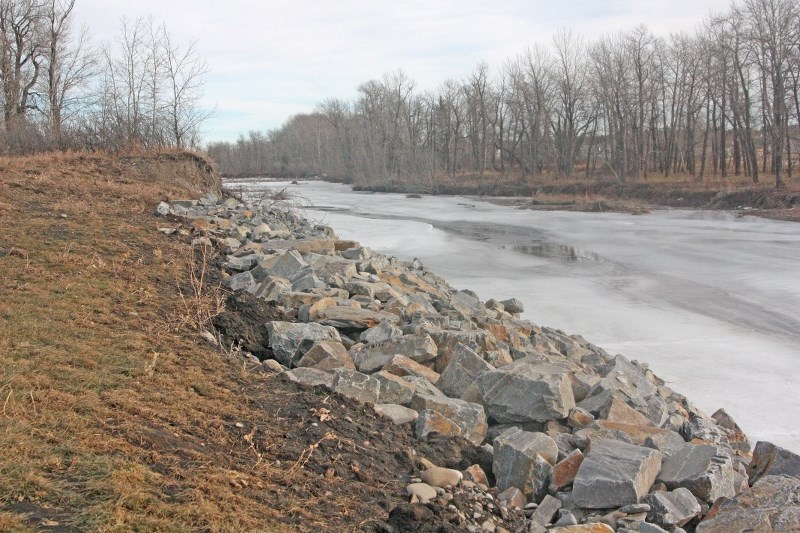Despite declaring Turner Valley’s drinking water safe, the provincial government is requiring the Town to make some changes.
Shannon Phillips, Alberta minister of environment and parks, has ordered the Town to change when and how it monitors its water and improve communication with the public based on recommendations by the Environmental Appeals Board.
The order follows a four-day appeals board hearing held in the spring over concerns from residents Roxanne Walsh and Julie Walker regarding the town’s drinking water supply.
“The bottom line here is everything the board has seen tells us that the water in the town is safe,” said Gilbert Van Nes, the board’s counsel. “There is no issues with it. It’s just what we learned from the hearing gave us the opportunity to try to make things better.”
The hearing was held in response to Walsh and Walker’s appeals regarding the construction of an infiltration gallery in the Sheep River and its connection to the water treatment plant, citing concerns the gallery is close to a former landfill site used by the Turner Valley Gas Plant and 18 decommissioned septic fields in Calkins Place.
Walker also submitted an appeal in response to the Town’s request that Alberta Environment reduce its hefty testing and monitoring restrictions for its raw water reservoir, established after Walsh appealed the construction of the reservoir in 2008 due to her concerns about contaminants in the vicinity.
Van Nes said following extensive monitoring in the area, the board doesn’t believe the Town’s water is being impacted by the 100 years of oil and gas history in the Turner Valley area, but felt there was room for improvements.
Among them is reviewing the Town’s water sampling schedule to get better readings.
Van Nes said rather than sample its water four times a year, the Town must do so during periods with the highest and lowest potential for contamination.
He said it’s up to the Town to determine when those two times will be and submit it to Brock Rusch, Director of Environment, by April 2016 for approval.
Rusch may require the Town to alter those times if changes in the groundwater occur as a result of the 2013 flood, said Van Nes.
“It could be five or 10 years from now when everything settles with the flood,” he said. “If everything stays stable like it seems to be doing this may never get used.”
The Town is also required to improve its water sampling practices.
“They are getting situations where there is no water, nothing to measure,” said Van Nes. “We’ve asked them to look at those based on the new information we had from the hearing.”
The Town must submit a proposal to Rusch no later than April 2016. If the problem can’t be fixed, Van Nes said the Town may be required to dig new sampling wells. It’s also required to develop a low-flow sampling pilot project to be approved by Rusch by April 2016 due to its collection problems, said Van Nes.
“It’s just testing the methodology to see if it produces anything better than what they’re doing now,” he said. “One of the problems with the regular sample system is before you take a sample you have to empty it three times. With low-flow you don’t empty it. We’ll see whether this is a way to produce better information or not.”
Van Nes said it should result in more data and cut costs.
The final requirement of the Town is to reinstate its Waterworks Advisory Committee, established following Walsh’s raw water reservoir appeal consisting of public and Town council members, to meet twice a year and involve the QUAD Regional Water Partnership.
In addition, all written communication between the Town and Alberta Environment and Parks regarding the waterworks system must be posted on the Town’s website.
“Communication and the sharing of information is not working as effectively as it should be,” he said. “The whole theme of this change is to encourage better sharing of information between the QUAD organization, the waterworks advisory committee and members of the community.”
Walsh and Walker wrote in an email that they look forward to the reformation of the advisory committee and that Walker already expressed her interest in joining it to Town administration.
“We are hopeful this will be a consultative process as opposed to being presentation oriented or adversarial,” they wrote.
Walsh and Walker wrote they also look forward to being able to access information about the Town’s drinking water online and hope the information will be timely and relevant.
They added they expect to receive the results of the low flow water testing pilot project, which was recommended by Dr. Udo Wyer during the hearing.
Turner Valley Mayor Kelly Tuck said while she hasn’t had the opportunity to review the Minister’s requirements with administration and can’t comment on the document, she is glad the board felt the Town met all of its requirements regarding its water.
“When the board looked at what we were doing with our testing they truly believe that there is nothing wrong with our water,” she said. “We are following all of the regulatory regimes that was set out by the province and the federal government.”
Tuck said she expects administration will meet to discuss the document within the next couple of weeks.




